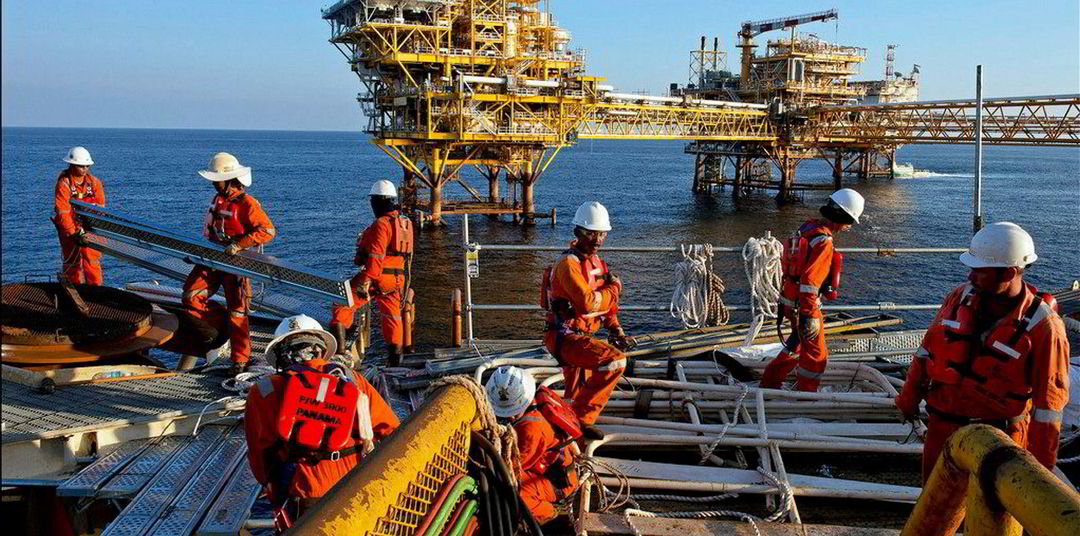Image: TotalEnergies
The future of Burma’s controversial Yadana gas field remains unclear, two months after French and US energy giants TotalEnergies and Chevron both announced that they were to exit the venture.
Total and Chevron, integral to the Yadana project since its development in the 90s, held pre-coup stakes in the fields, located in the Andaman Sea off the Rakhine coast, of 31% and 28.3% respectively.
Thai natural gas transmission company, PTT Exploration and Production (PTTEP), holds 25.5% of equity in Yadana, with the 15% remainder held by the Myanma Oil and Gas Enterprise (MOGE), a company directly owned by the Burmese military.
A key source of revenue for the generals, the project had, following the violence initiated by the February coup, once again come under fire from activists — notably those participating in the “Blood Money” campaign.
TotalEnergies spectacularly announced their plan to exit on Jan. 21, whilst also calling on the French government to introduce targeted sanctions which would allow cash flows related to the venture to be held in escrow accounts frozen to the MOGE without stopping gas production.
“Despite the actions taken, TotalEnergies has not been able to meet the expectations of many stakeholders (shareholders, international and Burmese civil society organisations), who are calling to stop the revenues going to the Burmese state through the state-owned company MOGE from the Yadana field production,” the statement said.
“In fact, this is materially impossible for TotalEnergies, as most of the payments for the sale of the gas are made directly by the Thai company PTT, the buyer of the exported gas.”
On February 22, the EU officially sanctioned MOGE. Despite calls from advocacy and pressure groups for the US and UK governments to follow suit, other nations have so far refused to follow Brussels’ lead.
In the meantime, Yadana’s other major shareholder, American energy giant Chevron, has said it has taken on TotalEnergies’ shares — yet only as a stopgap measure as it awaits a viable commercial exit.
TotalEnergies had, on the other hand, pulled out of Burma without seeking compensation for its stake, citing an inability to make a “sufficiently positive contribution”. Chevron claims its decision to stay put for now effectively prevents the MOGE from maximizing gains made from the venture.
A Chevron spokesperson told DVB in a statement that, as its exit plans are independent of those laid out by Total, respective timelines will differ.
“We do not have an exit date. An exit date will depend on several factors, including the progress of confidential commercial discussions, transfer of operatorship and the well-being of our employees,” the spokesperson said. “Chevron intends to accept its share of Total’s interest in so far as it supports our objectives of achieving a safe and orderly transition.”
Chevron also expressed what it calls its commitment to the continuity of natural gas supply for Myanmar and Thailand’s populations.
Thai company PTT Exploration and Production Public Company Limited (PTTEP), who many believe will emerge as the sole partner to MOGE at Yadana, said in a March 14 statement that it has now been appointed as operator of the project by remaining stakeholders.
The company has since said that it would begin to absorb some of Total’s assets by purchasing the outgoing French firm’s equity.
While PTTEP could not be reached for comment, the group’s statement outlined that a transfer of operations will be completed on July 20, with PTTEP henceforth holding about a 37% interest and Chevron subsidiary Unocal Myanmar Offshore Co. Ltd. with 41% — a stake that means that, regardless of expressed intent, the US company is now the majority shareholder in the Yadana gas fields.
“After the decision of TotalEnergies to withdraw from Yadana project, PTTEP has thoroughly considered to take a step as the successor operator in order to ensure the no interruption of natural gas supply and to reinforce long-term energy security especially in the current circumstances, where other forms of energy are not primary source for electricity generation,” their release said.
The Yadana field produces natural gas at a rate of approximately 770 million standard cubic feet per day (MMSCFD) — 550 MMSCFD of which is said by Thai media sources to feed directly into a grid serving 11 million people living in western and central Thailand. The project is also believed to service around 50 percent of Burma’s total demand for gas.
Human Rights Watch — which has documented potential human rights violations arising since the inception of the project in the early to the mid-90s — alleges that PTTEP has been integral to the project from its start. The group says it has evidence of forced labor, the displacement of villages, and the use of unnecessary force against villagers during the construction of the Yadana pipeline.
“The same kind of impunity Myanmar’s murderous military enjoys is evidently alive and well in both the Thai government and the PTTEP, which seem determined to benefit to the maximum extent regardless of the suffering their actions inflict on the Burmese people,” Phil Robertson, Deputy Asia Director of Human Rights Watch said.
“PTTEP has repeatedly demonstrated that it’s not even remotely interested in human rights so it is absolutely laughable that it somehow thinks it can disguise its crude self-interest using rights terminology about “access to energy.”



